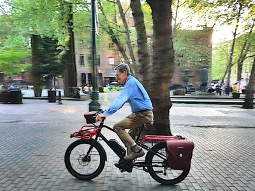- 408-924-7560
- mineta-institute@sjsu.edu
- Donate
Cycling Past 50: Older Americans Pedaling through the Pandemic

Many older adults enjoy cycling and intend to continue doing so as long as they can. Their cycling experiences and desires vary by age, their health, where they live, who they cycle with, and how they think about cycling as part of their lives. New Mineta Transportation Institute (MTI) research, Cycling Past 50: A Closer Look into the World of Older Cyclists, documents the results of the 50+ Cycling Survey, which is a nationwide survey of older adults who cycle. Understanding this information will better inform planning and policy directed at the needs of older adults and provide tools and resources for people who wish to extend their cycling beyond traditional limits brought about by aging.
Results of this survey represent over 2,000 respondents ages 50 to 85-plus and can be used by engineers, planners, public health and recreation professionals, advocates, decision-makers, and others. This survey is in its third year, and this year’s results include the impacts of COVID-19, as well as the impact of aging on ability and agility, the impact of the built environment, types of bicycles, and opportunities to cycle with others.
Key take-aways from the analysis of survey results include:
- Many older adults cannot envision a time when they would stop cycling but admit that a physical condition could make it difficult to continue cycling. Many will need to adapt to their changing cycling abilities with a different bicycle, a different expectation about their cycling experience, and local programs to encourage sustained cycling.
- A fair number of respondents learned to cycle as an adult, which suggests that local programs can also encourage older adults to learn to ride and how to select a bicycle. For example, around a third of respondents over age 86 learned to cycle between ages 20 and 50, and more than 10% of respondents aged 50-55 learned in that age range.
- Lower cycling rates may result from not having a “bikeable” (in safe operation) or proper-fitting bicycle, or the money to fix or purchase a bike.
“The next survey will feature a variety of improvements, including better outreach to achieve better representation of ethnicity and income,” reported author Carol Kachadoorian.
This survey helps answer the question: how can our growing understanding of older cyclists affect policy, programs, design, and practice? Researchers identified some issues for further consideration, including how education and outreach can help reduce near misses, how planning and engineering can help reduce near misses, and how falls due to poor infrastructure or maintenance can be reduced. In the end, older adults will continue pedaling forward, and information from surveys such as these can aid in supporting the mobility of this generation and people of all ages across the nation.
ABOUT THE MINETA TRANSPORTATION INSTITUTE
At the Mineta Transportation Institute (MTI) at San Jose State University (SJSU) our mission is to increase mobility for all by improving the safety, efficiency, accessibility, and convenience of our nations’ transportation system. Through research, education, workforce development and technology transfer, we help create a connected world. Founded in 1991, MTI is funded through the US Departments of Transportation and Homeland Security, the California Department of Transportation, and public and private grants, including those made available by the Road Repair and Accountability Act of 2017 (SB1). MTI is affiliated with SJSU’s Lucas College and Graduate School of Business.
ABOUT THE AUTHOR
Carol Kachadoorian is an MTI Research Associate with expertise in transportation planning and operations, which began in Alexandria, VA, where she served as a transit analyst before leading the city’s first Office of Transit Services. Carol later worked with the Washington, DC region’s transit agency, first in operations and then focusing on pedestrian and bicyclists' access to transit. Carol’s work with Toole Design from 2008 to 2020 focused on school- and community-based active transportation plans. She started dblTilde Collaborative in 2020, specializing in older adult mobility and wellness.
Media Contact:
Irma Garcia,
MTI Communications and Operations Manager
O: 408-924-7560
-
Contact Us
San José State University One Washington Square, San Jose, CA 95192 Phone: 408-924-7560 Email: mineta-institute@sjsu.edu





